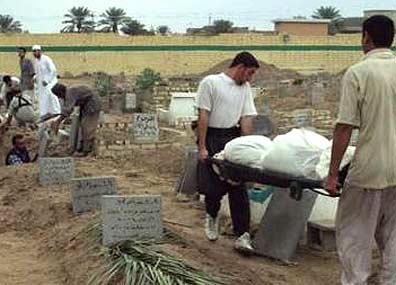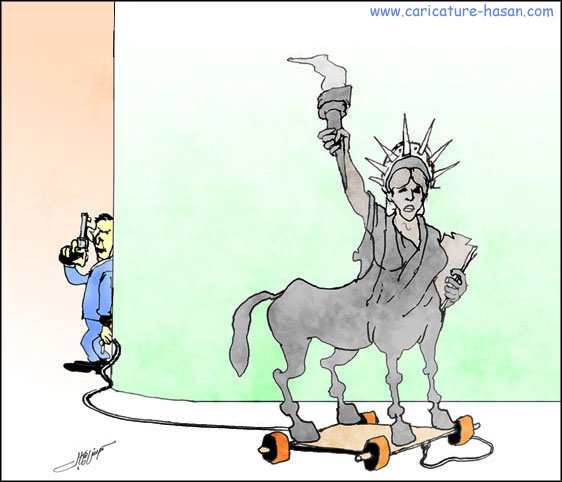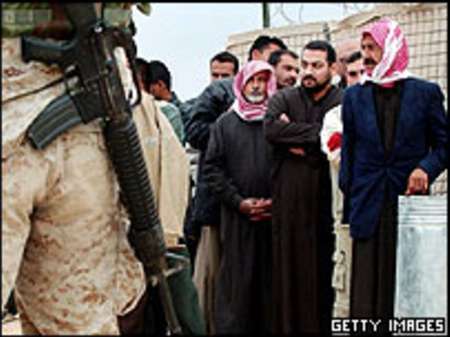
january 2005
- Death of
Civilians: 700 s0-far in 6 out of 27
neighbourhoods to be searched.
 Emergency teams from the Fallujah
Hospital have recovered 700 bodies of Iraqis from
the ruins of houses destroyed in the US offensive
on the city. Among the 700 bodies were 504 bodies
of women and children; the rest elderly and
middle aged men.
Emergency teams from the Fallujah
Hospital have recovered 700 bodies of Iraqis from
the ruins of houses destroyed in the US offensive
on the city. Among the 700 bodies were 504 bodies
of women and children; the rest elderly and
middle aged men. - Dr. Tamir Salih al-'Ani, who is in charge of the morgue in Fallujah General Hospital has reported that emergency teams from the Fallujah Hospital have recovered 700 bodies of Iraqis from the ruins of houses destroyed in the course of the US aggressors' offensive on the city. Dr. Salih confirmed that among the 700 bodies were 504 bodies of women and children. The rest are the bodies of elderly and middle aged men.
- Dr. Salih explained that the bodies were dug out from the ruins on the streets of Fallujah, recovered from rooftops, and dug out of gardens. Many of the dead perished in barbarous ways, their bodies burned by American chemical weapons. A number of others had been stabbed. The body of one woman showed that she had been bayoneted in her thigh, chest, and head.
- Mafkarat al-Islam's correspondent reported that these findings were the result of work done in just six of Fallujah's neighborhoods. There are in all 27 residential neighborhoods in the city. The death toll is therefore constantly rising as there are still large numbers of reports of buried bodies on which the medical teams have not yet had a chance to follow up.
- http://www.jihadunspun.com/newsarchive
- /article_internal.php?article=101111&
- list=/newsarchive/index.php&

Fallujah To Be A
Virtual Concentration Camp
A
Phoenix Program For Iraq
By Ron Jacobs
12-10-4
Retina scans to get into your own home. Work
details under armed guard. No cars. Military armor on
every corner. All men to be shot on sight after curfew.
No freedom of movement. These are just some of the
details of the new order in Fallujah (and one assumes any
other Iraqi city that the US destroys in the future).
Somewhere between a concentration camp and what US troops
called a strategic hamlet in Vietnam, this is the latest
version of Washington's "freedom and democracy"
installation in Iraq. How much clearer does it have to
become before the US media and its brainwashed audience
admit to themselves that this whole adventure is about
domination and control? If there are any arms caches left
in Fallujah after the US military finishes its so-called
security searches, one can guarantee that these draconian
measures being put into place will insure that those
weapons will be used against US forces.
Who
the hell do the US forces think they are? No matter how
many ID badges they make people wear and guns they point
in their face, they will not gain the trust of these
people. That moment passed months ago. The oil that
Washington wants to control will never be under their
control and neither will the people of Iraq. This latest
plan - a plan that essentially turns the Iraqi cities
into prison camps - acknowledges that the US has lost the
battle for many Iraqis hearts and minds and that it can
only hope to get its way via coercion and murder. One
only has to look at France's Algeria, Israel's Palestine,
or Washington's Vietnam to realize the historical
possibilities.
Yet,
the historical ignorance and arrogance of Washington
marches on. Donald Rumsfeld is on record as of December
6, 2004 as saying that he believes US troops will be gone
from Iraq within four years. If I hadn't heard about some
kind of light at the end of some tunnel during the US war
on Vietnam, perhaps I could believe the man.
Unfortunately, I remember that light and that tunnel too
well. Even Mr. Rumsfeld has some kind of recall of it. He
did qualify his statement by saying that this US
withdrawal would be based on the "progress" of
the Iraqi government that Washington is attempting to
create over there. That progress will be measured, of
course, in the degree of compliance (nee servitude) said
government has with Washington.
Indeed,
the success of the plan for Fallujah is directly tied to
Washington's withdrawal. If the US troops are somehow
much more successful in locking up all those Iraqis who
despise their presence into strategic hamlets than they
were in southern Vietnam, then the troops will able to
leave when Donald Rumsfeld wants them to. If the lockdown
of Fallujah and other rebellious Iraqi cities and towns
is no more successful than Operation Phoenix was in
Vietnam, then the US military will leave, but only
because they have been driven out. Either way, thousands
of Iraqis will be killed solely because they are in the
Pentagon's way.
Another,
less-publicized aspect of the police state mechanisms
that the US hopes to put in place in Fallujah is the
creation of so-called work brigades that would
essentially force male residents of Fallujah into forced
labor battalions. I can almost see these men now-wearing
khaki overalls with the flag of the US-created Baghdad
regime sewn on the back and their name and address
stitched onto the front breast pocket. Just like the
chain gangs in the southern states of the US, these men
will be working under armed guard. Perhaps they'll even
be forced to wear chains around their ankles as they
rebuild the city their captors destroyed in the name of
their freedom and liberty.
I even
have a design idea for the city's entry gates. How about
an archway with the Arab equivalent of the words
"Arbeit Macht Frei?" I mean, what with the napalm
our military dropped on the city during its most recent
"liberation," we've already provided them with
the modern day equivalent of Nazi Germany's ovens. Sure,
the incineration of our fellow humans by napalm is not as
methodical as that arranged by Adolf Eichmann and his
cohorts, but that's only because those who are doing the
burning in our name don't have instructions to be
selective in whom they kill. After all, their commander
has told these soldiers that the Iraqis deserve to die
because they wear the face of satan.
Ron Jacobs is author of The Way the Wind Blew: a history
of the Weather Underground, which is just republished by
Verso. Jacobs' essay on Big Bill Broonzy is featured in
CounterPunch's new collection on music, art and sex,
Serpents in the Garden. He can be reached at:
rjacobs@zoo.uvm.edu
Doctor is
haunted by siege of Fallujah
By ALISSA
J. RUBIN
Los Angeles Times
November 15. 2004 8:00AM
AGHDAD, Iraq - Dr. Ahmed Ghanim's nightmarish week began with a phone call in the operating room of a triage center in downtown Fallujah.
On the line was the manager of the city's General Hospital. Iraqi national guardsmen and U.S. Marines, the manager said, had entered the hospital, handcuffed the doctors and were forcing the patients out to the parking lot.
The guardsmen "stole the mobile phones, the hospital safe where the money is kept and damaged the ambulances and cars," said Ghanim, an orthopedic surgeon who works at the hospital. "The Americans were more sympathetic with the hospital staff and . . . untied the doctors and allowed them to go outside with the patients."
"We were kicked out by the (Iraqi National Guard); even the Americans weren't as harsh as them," said Farhan Khalaf, 58, who had been at Fallujah General Hospital when it was seized.
"They were roughing up patients and tying up the doctors, hitting them in some instances,"he added. "They stole whatever valuables they could get their hands on, including money and cell phones. This is unacceptable. How could they do this against their own people?"
But the worst was yet to come. In the coming days, Ghanim would narrowly escape a bombing, then run through his city's battle-torn streets. He would walk hungry and scared for miles, carrying with him memories of the people he could not save.
The fight for Fallujah began Nov. 7. The hospital, the city's main medical center, was seized that night by U.S. and Iraqi troops. Military commanders said it was taken to ensure that there was a medical treatment facility available to civilians and to make sure that insurgents could not exaggerate casualties.
As fighting raged for a week, few civilian accounts of the battle have been available, and there have been only scattered reports on casualties. But as combat eased, Ghanim and other survivors emerged and began to tell their stories.
Last Monday came and went. On Tuesday, the bombing came closer to the city center. The doctors were busy.
"I was doing amputations for many patients. But I am an orthopedic surgeon; if a patient came to me with an abdominal injury, I could do nothing," he said, eyes cast down, close to tears. "We would bring the patient in, and we would have to let him die."
Electricity to the city was cut off. There was no water, no food, no fluids for the patients, Ghanim said. But the patients just kept coming.
"We were treating everyone. There were women, children, mujahids. I don't ask someone if they are a fighter before I treat them. I just take care of them," he said.
Late Tuesday, a bomb struck one side of the triage center. Ghanim ran out of the building.
A second bomb hit, crashing through the roof and destroying most of the facility. Ghanim believes it killed at least two or three of the young resident doctors working there and most of the patients.
"At that moment, I wished to die," he said. "It was a catastrophe."
Afterward, he said, he half-ran, half-wandered through Fallujah, dodging explosions that seemed to be everywhere. He took shelter in an empty house and did not move.
"I saw the injured people on the street, covered in blood, staggering, screaming, shouting, 'Help me! Help me!' but we could not get out and help them because we would be killed."
At one point, he looked out and saw a cousin in the street; he had been wounded. "I could not do anything for him, I could not move," Ghanim said. "He died. There was no mercy."
During a lull in the bombing, the doctor decided to try to leave Fallujah. As he made his way through the rubble-filled streets, some fighters, Fallujah natives like himself, recognized the surgeon. They showed him a way out. He walked with a companion - an anesthetist - along the river, heading north.
First they walked to Saglawiya, a nearby village, he said, then more than 12 miles to the next village. There, a car picked them up and drove them about three miles. They resumed walking, occasionally getting a lift from a passing vehicle.
It took them 36 hours, mostly on foot, to make it the more than 30 miles to Baghdad. They didn't sleep and ate only a few dates and a packet of biscuits.
Yesterday, as Ghanim recounted the week that was, he was clearly haunted by what might have been, and those he could not help.
"I think if the Americans let us treat the injured, even in the streets," he said, "we could have saved hundreds."
By ALISSA J. RUBIN

Photo, some men and their families return to Fallujah.
Getty Images